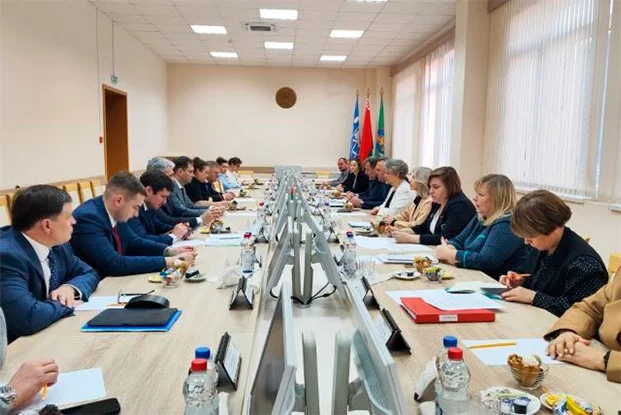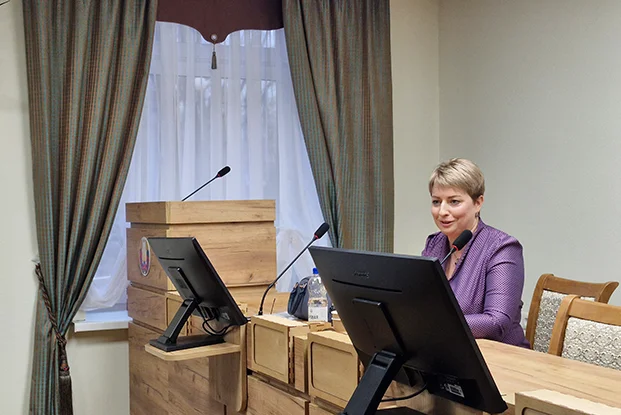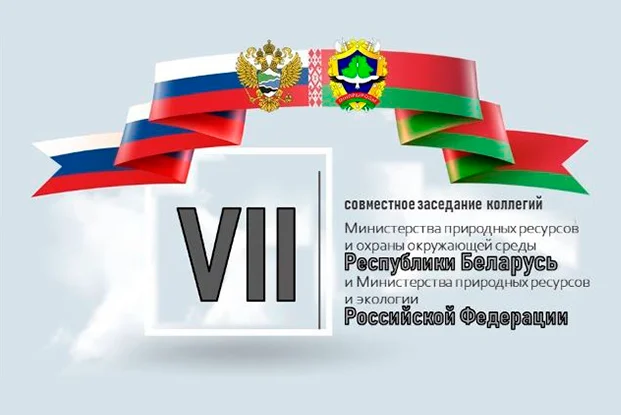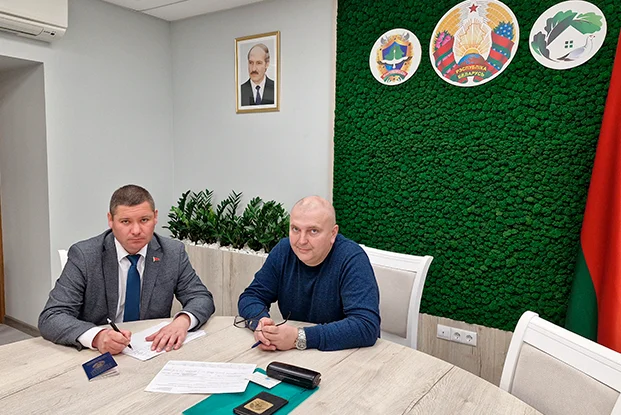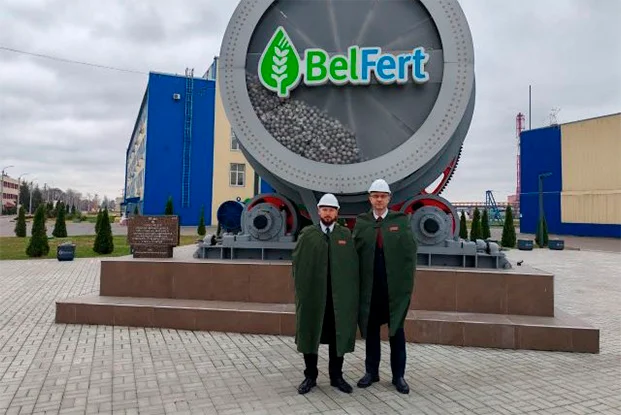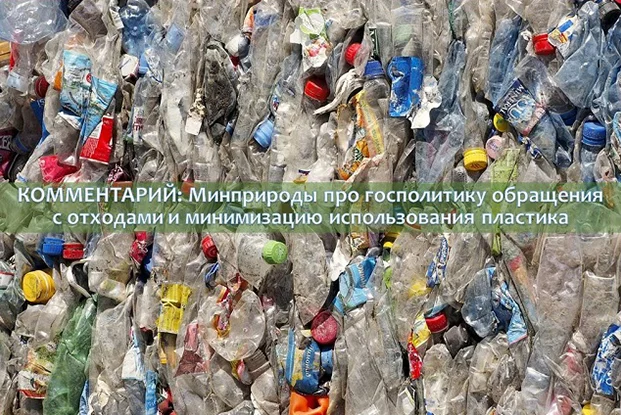
The National Strategy for Municipal Solid Waste (MSW) and Secondary Material Resources Management in Belarus until 2035 sets the task of improving the system, increasing the level of waste recycling and use. Target indicators and activities in this area are defined in the state program “Comfortable Housing and Favorable Environment” for 2021-2025. Particular attention is paid to minimizing the use of plastic packaging. Thus, since 2020, an action plan has been implemented aimed at a gradual reduction in the use of polymer packaging and its replacement with environmentally friendly ones. Maxim Tarasov, Deputy Head of the Main Department for Waste Management Regulation, Biological and Landscape Diversity – Head of the Waste Management Regulation Department of the Ministry of Natural Resources and Environmental Protection, spoke at the BELTA press center about the state policy in the field of waste management and the measures taken to minimize the use of plastic packaging.
On the state policy of Belarus in the field of waste management
The legal basis for waste management in the Republic of Belarus is defined by the Law of July 20, 2007 No. 271-3 “On Waste Management”. It is aimed at reducing the volume of waste generation and preventing its harmful impact on the environment, the health of citizens, state-owned property, property of legal entities and individuals, as well as the maximum use of waste, including the involvement of waste in civil circulation. In order to improve the legislation in the field of waste management and taking into account the practice of application, the Law of December 29, 2023 No. 333-3 “On Amendments to the Law of the Republic of Belarus “On Waste Management” was adopted, which comes into force on October 6, 2024.
Maxim Tarasov noted that according to the new version of the Law, the terminology in the field of waste management has undergone changes. The main principles in the field of waste management have also been clarified, the main directions of a unified state policy in this area have been introduced in order of their priority: prevention of waste generation, reduction of waste generation volumes, waste recycling, use of waste for energy production (generation), use of waste for work (provision of services), waste disposal
In order to exclude unjustified mediation in waste management and to prevent waste from entering the environment, the new version of the Law clarifies the range of entities and objects to which waste may be alienated and for what purposes. Thus, in particular, the alienation of waste to another business entity engaged in waste management is permitted only for the purposes of their procurement or sorting (to business entities engaged in the relevant activities), use, and disposal (to facilities included in the register of waste storage, disposal, and disposal facilities). Alienation is also permitted for the performance of research, development, and experimental-technological work related to the use and disposal of waste and in the event of their removal for use, disposal, disposal, and storage outside Belarus.
“In this regard, the need to register transactions on the transfer of hazardous waste for a specified period (except for a transportation agreement) or on the alienation of hazardous waste to another business entity is eliminated,” emphasized Maxim Tarasov.
Also, the new version of the Law provides for norms concerning the acquisition of ownership rights to consumer waste and secondary material resources obtained as a result of the demolition of objects and having value.
“A legal entity providing services for the handling of municipal solid waste, in relation to consumer waste, acquires the right of ownership to such waste from the moment of its placement in authorized waste storage sites by individuals who are both the producers and owners of such waste. In addition, the right of ownership to the SMR obtained as a result of the demolition of objects and having value, from the moment of the formation of such waste is acquired by the customer or contractor on the basis of an agreement concluded in accordance with civil legislation,” said a representative of the Ministry of Natural Resources
The rules concerning “ownerless” waste have also been amended. The new version of the Law stipulates that waste found on land plots is considered the property of the land users of these plots and they are obliged to ensure their collection and removal, as well as take other measures to prevent their harmful impact on the environment, human health, and property. In the event that waste producers are identified who have placed waste on land plots that do not belong to them, they remove this waste, take other measures to prevent its harmful impact, or reimburse the cost of such work to land users.
Also, the circle of business entities for which exceptions were provided in terms of compliance with general legislative requirements for waste management has been clarified. If previously, when carrying out economic activities, individual entrepreneurs and microorganisms were granted the right not to appoint officials responsible for waste management, not to develop instructions for waste management, and not to keep records or conduct an inventory of them, then, in accordance with the new version, only those individual entrepreneurs and microorganisms that work in the area of procurement, sorting, neutralization, use, burial and long-term storage of waste are not exempt from such obligations. Also, individual entrepreneurs carrying out such activities must keep records of waste and conduct an inventory of it.
The new version of the Law has revised a number of new requirements for the implementation of activities related to the use, disposal, burial and storage of waste, including the placement, construction, operation, decommissioning or demolition of facilities where such activities are carried out. In particular, the implementation of research, development and experimental technology work related to the use and disposal of waste is permitted only in accordance with the priority areas of scientific, scientific, technical and innovative activities and in relation to the amount of waste established by the technical specifications. The use of waste by individuals for their own needs is permitted, with the exception of prohibited ones. The use of waste (estimates) from cleaning territories (with the exception of territories of industrial enterprises) is permitted for the isolation of waste layers.
In addition to the previously existing prohibitions, the use, disposal and burial of waste by business entities without the appropriate technological regulations, the burial of waste subject to disposal and consumer waste that has not been sorted (with exceptions), etc. are also prohibited.
In order to systematize and ensure safe handling of medical waste and waste generated during the performance of tasks to ensure national security and defense, the new version of the Law grants powers to the Ministry of Health, together with the Ministry of Natural Resources and Environmental Protection, to establish procedures for handling medical waste, and to the Ministry of Defense, in agreement with the Ministry of Natural Resources, to establish procedures for the disposal of waste generated during the performance of tasks to ensure national security and defense.
Minimizing the use of plastic packaging
In order to minimize the use of plastic packaging, the Government approved and is implementing an action plan in 2020 aimed at gradually reducing the use of polymer packaging and replacing it with environmentally friendly packaging.
The plan provides for 19 events in five main areas: improving the waste management system and reducing the use of polymer packaging, events in the field of scientific research, in the field of production and use of environmentally friendly packaging, in the field of technical regulation and reduction of packaging imports, as well as in the field of information and educational polymer work among the population, children and young people, – explained Maxim Tarasov. – According to the results of 2023, out of 19 planned events, about 10 were completed according to the established deadlines, 3 events are carried out on an ongoing basis, 6 are planned for implementation in 2024-2025″
In the area of production and use of environmentally friendly packaging in Belarus, work is constantly underway to create new and modernize existing production facilities for environmentally friendly packaging (made of paper, cardboard, glass, including disposable tableware). The key producers of environmentally friendly packaging are the pulp and paper enterprises of the Bellesbumprom concern.
Maxim Tarasov gave examples that indicate an increase in the production of environmentally friendly packaging and, as a result, a decrease in the use of plastic packaging.
“Thus, since 2020, as a result of the modernization of the paper-making machine existing at the Paper Factory of Goznak, the annual productivity of packaging paper with barrier properties has increased by 300 tons compared to 2019. The growth rate in 2023 of the production of environmentally friendly packaging at the Paper Factory of Goznak amounted to 108% of the 2022 level. In 2022, Vitebsk Cardboard and Printing Plant Pokrovsky OJSC put a corrugated box production line into operation. As a result, the growth rate of corrugated cardboard production in 2023 compared to 2022 amounted to 118.9%. A number of enterprises continue to increase production volumes. Superpack Company LLC has ensured an increase in paper sack production by 10.87% by 2022. In 2023, Barinpak LLC produced more than 250 thousand units of self-assembly packaging for vegetables, fruits and berries from high-density fiberboard, which is 4.5 times more than in the previous year,” he noted.
As for the issue of recycling polymer packaging waste, the situation in the republic is as follows. The register of waste management facilities contains about 1.7 thousand waste management facilities, of which more than 160 use various types of plastic waste, including polymer packaging waste. According to the state statistical reporting of the Ministry of Natural Resources, at the end of 2022, the level of use of polymer waste related to production waste was 92%. The volumes of plastic waste collected from the population are also gradually increasing. Over the past ten years, this figure has increased by about 4 times (from 27.3 thousand tons in 2012 to 106.8 thousand tons in 2022 and 113.5 thousand tons in 2023).
Information by BELTA




